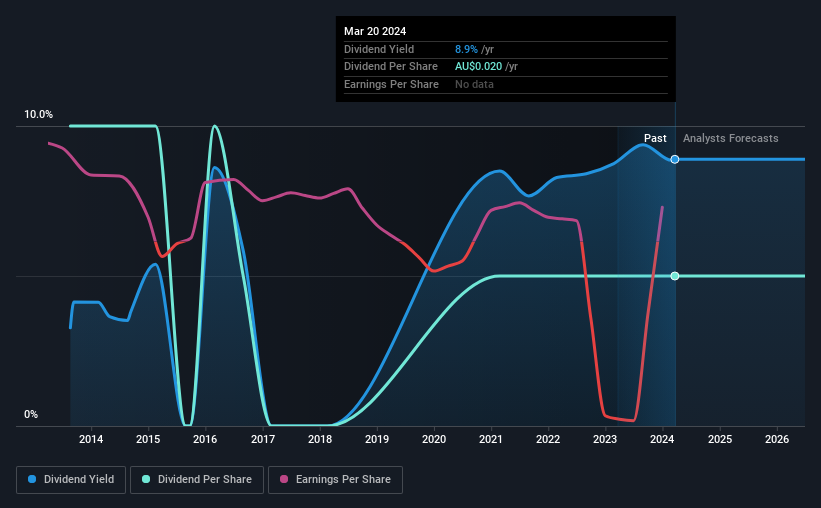It Might Not Be A Great Idea To Buy Cash Converters International Limited (ASX:CCV) For Its Next Dividend
It looks like Cash Converters International Limited (ASX:CCV) is about to go ex-dividend in the next 4 days. The ex-dividend date is one business day before the record date, which is the cut-off date for shareholders to be present on the company's books to be eligible for a dividend payment. The ex-dividend date is an important date to be aware of as any purchase of the stock made on or after this date might mean a late settlement that doesn't show on the record date. Meaning, you will need to purchase Cash Converters International's shares before the 25th of March to receive the dividend, which will be paid on the 12th of April.
The company's next dividend payment will be AU$0.01 per share, and in the last 12 months, the company paid a total of AU$0.02 per share. Calculating the last year's worth of payments shows that Cash Converters International has a trailing yield of 8.9% on the current share price of AU$0.225. Dividends are an important source of income to many shareholders, but the health of the business is crucial to maintaining those dividends. So we need to investigate whether Cash Converters International can afford its dividend, and if the dividend could grow.
See our latest analysis for Cash Converters International
Dividends are typically paid out of company income, so if a company pays out more than it earned, its dividend is usually at a higher risk of being cut. Cash Converters International paid out more than half (68%) of its earnings last year, which is a regular payout ratio for most companies.
Generally speaking, the lower a company's payout ratios, the more resilient its dividend usually is.
Click here to see the company's payout ratio, plus analyst estimates of its future dividends.
Have Earnings And Dividends Been Growing?
When earnings decline, dividend companies become much harder to analyse and own safely. If earnings decline and the company is forced to cut its dividend, investors could watch the value of their investment go up in smoke. Readers will understand then, why we're concerned to see Cash Converters International's earnings per share have dropped 8.2% a year over the past five years. Ultimately, when earnings per share decline, the size of the pie from which dividends can be paid, shrinks.
Many investors will assess a company's dividend performance by evaluating how much the dividend payments have changed over time. Cash Converters International has seen its dividend decline 6.7% per annum on average over the past 10 years, which is not great to see. It's never nice to see earnings and dividends falling, but at least management has cut the dividend rather than potentially risk the company's health in an attempt to maintain it.
The Bottom Line
Has Cash Converters International got what it takes to maintain its dividend payments? Earnings per share have been declining and the company is paying out more than half its profits to shareholders; not an enticing combination. Cash Converters International doesn't appear to have a lot going for it, and we're not inclined to take a risk on owning it for the dividend.
So if you're still interested in Cash Converters International despite it's poor dividend qualities, you should be well informed on some of the risks facing this stock. Be aware that Cash Converters International is showing 3 warning signs in our investment analysis, and 1 of those is significant...
Generally, we wouldn't recommend just buying the first dividend stock you see. Here's a curated list of interesting stocks that are strong dividend payers.
Have feedback on this article? Concerned about the content? Get in touch with us directly. Alternatively, email editorial-team (at) simplywallst.com.
This article by Simply Wall St is general in nature. We provide commentary based on historical data and analyst forecasts only using an unbiased methodology and our articles are not intended to be financial advice. It does not constitute a recommendation to buy or sell any stock, and does not take account of your objectives, or your financial situation. We aim to bring you long-term focused analysis driven by fundamental data. Note that our analysis may not factor in the latest price-sensitive company announcements or qualitative material. Simply Wall St has no position in any stocks mentioned.

